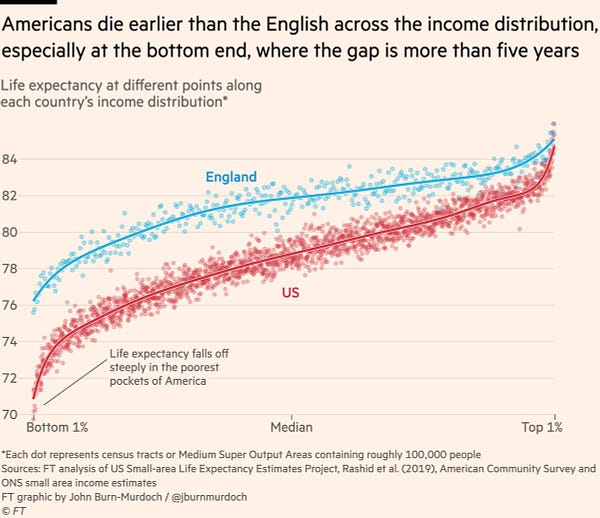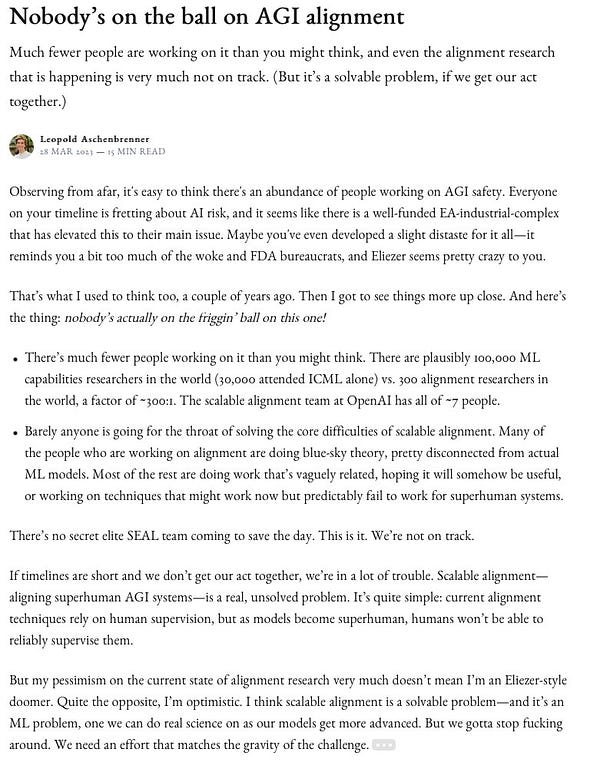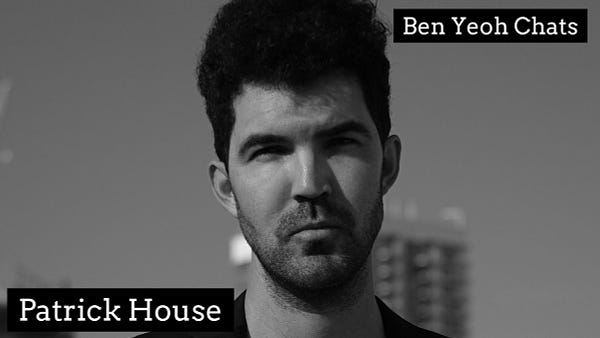My godmother died
My godmother died. What is consciousness? My podcast with Patrick House. E-shop closing, a form of grief. UK Govt Green Finance Strategy
My godmother died.
E-shop closing, a form of grief
UK Govt Green Finance Strategy
Bill Gates in a self-driving car
Annual Green Finance Prize
Spring slowly coming to London. The picture is O and I taking a pause from our tandem cycling in the park.
Links: Life expectancy; Italian Food history; climate adaptation CCC report; AI alignment challenges; Theatre writing podcast; Profile of Phelim McDermott re: Philip Glass Opera; Profile of Nassim Taleb; Sam Altman, Open AI; Policy ideas: green infrastructure; why geothermal is hard in Japan.
My godmother died. She was 95. I knew her best in her 60s and 70s. Along with her husband, she showed me kindness and generosity and a glimpse into a certain British way of life.
Many of my summer days across my childhood were spent larking in her huge garden. Tea and cucumber sandwiches were a regular feature. The understanding on why we use cutlery and how. The showing of manners.
On occasion, I heard her tell of the stories of wartime and after the war. Her tellings along with her husband’s made me understand why there was a fierce compulsion to finish and not waste food. They lived through a time of poverty. They lived through a time when there was not enough to eat. They lived through a time of high uncertainty.
Take what you can eat, no more. Waste not, want not.
I came to appreciate how the rules of manners can give us structure especially to people who have lived through such times of flux and uncertainty.
(There was a strand of social conservative which came with this that partly jarred with my young understanding of the world but I understood this small thread and where it came from even if it was not my globalised, urbanised, cosmopolitan world; and the hints that this cosmopolitan world might not all be roses.)
I had not seen much of their working lives, but understood that their business grew through the British manufacturing glory days. I recall learning about ties. The Windsor knot. There was a British tradition in making ties but by the time I was a teenager and had a small understanding that tradition and the manufacturing supporting it was firmly in decay.
[He sold I think by the early 1990s, this glimpse of the factory in Wales:
The factory at Frank Theak & Roskilly is a place of cacophony. Silk swishes against silk as hundreds of sewing machines whirr, hum and rattle like a machine-gun. FT&R has an impressive pedigree. It was founded in ther 1890s not long after the demise of high Victorian collars led young dandies to begin wrapping bright ribbons of silk around their necks. The start of the manufacturing process then would have been very similar to the 1990s Bolts of cloth hand-printed in Como arrive at the factory to be cut diagonally into three odd polygon shapes: one for the wide end, one for the tapering narrow end, and a smaller piece for the yolk that goes around the neck. In the 1960s the company moved from London in search of Welsh development grants and a skilled female workforce - female because men lack the dexterity to handle the delicate material at speed. .. also … Most ties are not bought by men, which explains why azure and crimson stripes adorn otherwise conservative necks atop grey pinstripe suits. from a 1996 Indy article]
She tried to introduce me to golf. Apart from practice putting, golf never took hold of me but I was still glad to glimpse that world of the golf club. I spent many enjoyable hours playing all kinds of putting games. Today video games would likely take its place, but I am glad I had so many Sunday afternoons putting.
Along with the great kindness, generosity and support I came to see what ageing looks like. What a life well lived in your 60, 70s, 80s, 90s might look like.
Some part of the current world is far away from that time: the challenges and opportunities of AI, same for climate and some have come around to touch us again: pandemics, wars.
With eyes open, there is plenty to learn from those much older than us who have lived though different times and my godmother certain taught me things I carry with me today.
I regret not being able to squeeze more time repaying her kindness by simply being company for her in her 90s (the loneliness of seeing your friends pass, her husband passed many years before) but I write this in gratitude and remembrance.
Perhaps, if you know someone in their 80s or 90s go and sit with them for a cup of tea and listen to their stories. Often the stories of their youth are remembered even when more recent stories are not.
Most of you will not care that Nintendo have closed the Wii U e-shop. For JP, this closure is a devastating event. He experiences grief in response to these endings.
Why do things which we don't want to change, change ?
When trains, e-shops, cafes disappear, is that not a kind of death ?
And if we fight or rage against these changes - is that not grief ?
Understanding that everyone experiences grief differently and for different reasons.
JP has his own ways of coping. They can be quite taxing including ritual visits and a form of night vigil involving no sleep. These are the kinds of things we do when we grieve.
Patrick House is a neuroscientist and writer. His research focused on the neuroscience of free will and in particular how mind-control parasites altered a rat’s behaviour.
We once had a long chat on the rainy streets of Glasgow. This chat – which I may not fully recall – involved speaking on what consciousness is, and touched on his work on mind-control bugs.
He’s written a collection of essays: Nineteen Ways of Looking at Consciousness on what we really don’t understand about consciousness.
“Consider different translations of a poem: Each has something relevant to say, but none can entirely capture the essence. House repeatedly returns to a case in which a woman was undergoing brain surgery to address epilepsy. At one point, the surgeons touched a part of the brain that made her laugh. Did this indicate that emotional responses are simply an aspect of the physical matter inside our skulls?” (Short Kirkus Review)
We had a long chat on this. I asked him:
About dreaming in colour
Whether lucid dreaming is real?
What he meant by: "If I were asked to create, from scratch and under duress, a universal mechanism for passing consciousness from parent to child, I would probably come up with something a bit like grafting a plant." ?
Memory in childhood
What he finds the most terrifying result in neuroscience
What translating poetry has in common with understanding consciousness
Whether animals have consciousness
What he thinks of AI and why he no longer plays Go
Patrick asks me if I would write a play only for robots.
We end on Patrick’s advice:
“My suggestion is to have phenomenological date night with whoever you're interested in the world and ask what their dreams are really like and if it's in images or what inside of their head is really like and see if you get anything, see if you solve any conflict.”
It was lovely long form chat about consciousness and the mind.
Other brief observations of the week:
Still huge debates going on re: AI which I don't think are quite hitting the mainstream.
Still a wide range of outcomes re: inflation, recession and like
Spring does seem to be coming to London.
On my Linkedin:
UK Govt Green Finance Strategy (highlights at end1)
Links:
A look at US life expectancy vs UK (and UK isn’t even that great vs EU)


Food history is not quite what you think. Many items are new inventions.


CCC adaptation report


AI alignment challenges


Theatre podcast


Profile of Phelim McDermott re: Philip Glass Opera


Profile of Taleb


Policy ideas to allow green infrastructure


Profile of Sam Altman, Open AI
Why geothermal is so hard to do in Japan (hot spring owners)






Selected highlights include:
- Further detail on our Net Zero-aligned Financial Centre framework
- Commitment to consult on transition plan requirements for the largest private companies
- Commitment to deliver our UK Green Taxonomy with Autumn 2023 consultation
- Further details on ISSB assessment and endorsement process
- ESG ratings regulation consultation out today alongside the Strategy
- Commitment to consult on VCMs
- Call for Evidence on Scope 3 disclosures coming later this year
- Launch of a Transition Finance Market Review, to be led by an industry figurehead and recommend how the UK can stay at the forefront of this market
- Updated Investor Roadmaps published and forthcoming, including detail on investment need for the first time
- Detail on our process to determine a robust methodology for investment tracking
- A clear articulation of the role our public finance institutions play alongside central Government funding, including an extra £10bn capacity for UKEF
- Proper incorporation of nature into our green finance policy framework, and a new Nature Markets Framework out today



